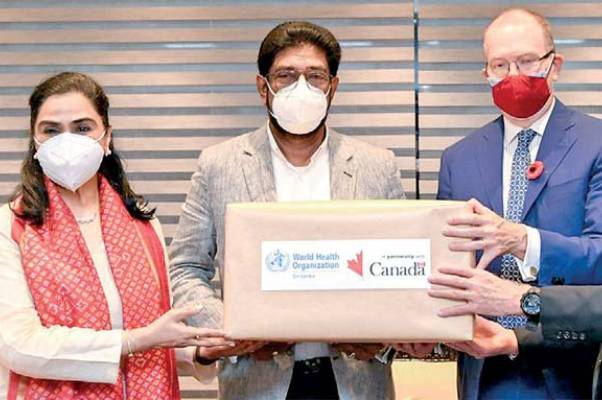The Government of Canada (Global Affairs Canada) has announced a $ 1.3 million grant for immediate assistance on COVID-19 as well as longer-term strengthening of primary healthcare through WHO Sri Lanka.
Urgent medical supplies including two million syringes for the accelerated COVID-19 vaccination effort arrived in Sri Lanka last August and medical equipment for 55 at the primary healthcare level has been procured.
Since March this year, the Government of Canada has made available $ 23.86 million to WHO to support 10 countries on COVID-19 response and recovery. In collaboration with the Ministry of Health, WHO Sri Lanka has developed a comprehensive implementation plan for the grant. The focus is on critical gaps in the COVID-19 response; and, key technical areas to put Sri Lanka back on track to further advance its notable achievements on universal health coverage.
Canadian High Commissioner David McKinnon said: “This is an excellent example where coordinating efforts through the multilateral system allows us to provide timely, essential support for the fight against COVID-19 in Sri Lanka. The WHO allocation complements the funding we provided through UNICEF for Oxygen Therapy and other critical equipment. It also builds on support provided through several partners since the start of the pandemic, to address the range of social and economic impacts of the pandemic.”
WHO Representative to Sri Lanka Dr. Alaka Singh noted: “The Canadian grant comes at a critical time for both response and recovery from COVID-19. Moreover, WHO appreciates the flexibility allowed in allocation of the funding which means we can be more responsive to country needs. A case in point is this procurement whereby we have been able to make a critical contribution to Sri Lanka’s ambitious vaccination drive through the supply of syringes. The longer-term perspective of the collaboration allows us to build towards sustainable recovery and a resilient primary health care system with MoH leadership. For example, to support our health workers who are at the frontline of the pandemic, including looking after their psychosocial well-being.”
(FT)

